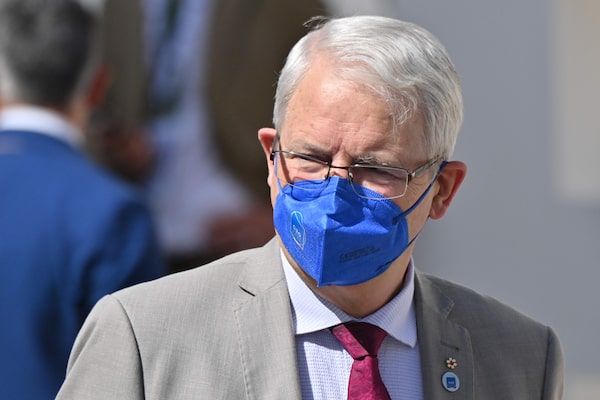
Canada's Foreign Minister Marc Garneau arrives for a G20 foreign and development ministers meeting in Matera, on June 29, 2021.ALBERTO PIZZOLI/AFP/Getty Images
Ottawa is calling on Eritrea to withdraw its armed forces from the Tigray region in Ethiopia, a couple days after a ceasefire was announced to put a hold on a conflict that has led to one of the world’s worst famine crises.
Foreign Affairs Minister Marc Garneau and International Development Minister Karina Gould said in a statement that Canada welcomes the ceasefire and urge all parties to allow unhindered humanitarian access.
“Canada calls on all parties to take this opportunity to pursue a peaceful resolution to the conflict that will bring sustainable security in the region,” Mr. Garneau and Ms. Gould said.
They said Eritrea, which has forces fighting with the Ethiopian government against the Tigray rebels, must pull its forces from the Tigray region immediately.
Ethiopia asserted Wednesday that soldiers from Eritrea had withdrawn from Tigray, but that could not immediately be confirmed and Eritrean officials did not respond to questions put to them by The Associated Press.
Ethiopia’s government on Monday declared an immediate, unilateral ceasefire in the region in an announcement that was carried by state media shortly after the Tigray interim administration, appointed by the federal government, fled the regional capital, Mekele, and called for a ceasefire.
Meanwhile, Mekele residents cheered the return of Tigray forces.
Mr. Garneau and Ms. Gould say Canada stands ready to support Ethiopia’s government and people in pursuing a national, inclusive political process and reconciliation that reflects the will of all citizens.
The ceasefire, which Ethiopia said will last until the end of the crucial planting season in September, could calm a war that has destabilized Africa’s second-most populous country and threatened to do the same in the wider Horn of Africa.
However, Ethiopia’s government on Wednesday said its military could re-enter the capital of the Tigray region within weeks.
The Tigray forces that have retaken key areas after some of the war’s fiercest fighters have rejected the ceasefire, saying it was a “sick joke” and vowing to chase out Ethiopian and Eritrean forces.
There will be no negotiations with Ethiopia until communications, transport and other services that have been cut or destroyed for much of the war are restored, the Tigray forces’ spokesman, Getachew Reda, said Wednesday.
“We have to make sure that every inch of our territory is returned to us, the rightful owners,” Getachew said, adding that Ethiopian forces are still fighting to regain territory and Eritrean forces still control a “significant part” of the region.
Ethiopia is one of the largest recipients of Canada’s international aid. The East African country had received almost $2 billion in aid from Canada between 2010 and 2019, according to the Canadian International Development Platform, a data-collecting initiative that operates out of Carleton University.
Advocates have called on Ottawa to stop sending millions of dollars in aid to the Ethiopian government and push for creating a no-fly zone and delivering airdropped food aid to the people of the Tigray region, who had been under attack from the federal military for nearly eight months before the ceasefire.
Azeb Gebrehiwot of the Association of Tigrayan Communities in Canada said Canadians should know their taxpayer money is funding the Ethiopian government, which has been committing atrocities in Tigray.
The conflict has led to the world’s worst famine crisis in a decade, with more than 350,000 people facing starvation, according to the UN and other humanitarian groups.
Know what is happening in the halls of power with the day’s top political headlines and commentary as selected by Globe editors (subscribers only). Sign up today.